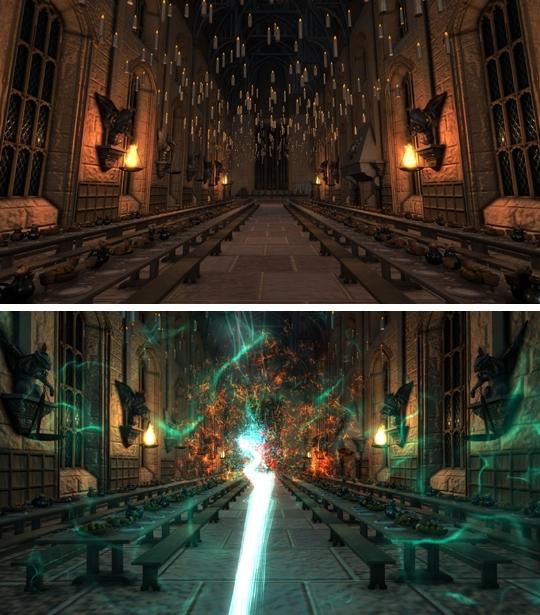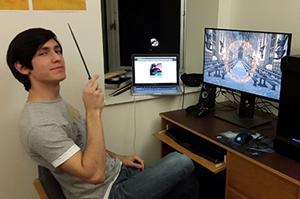The Artful Gamer: José Rico ’18 Conjures Digital Worlds

As an aspiring wizard, wand in hand, steps before a huge screen projecting an image of the Hogwarts School Great Hall of Harry Potter fame, José Rico ’18 waits. At the moment the youngster flicks his wand while pronouncing magic words, Rico does his magic—making the spell come to life with the click of his computer’s buttons.

“Bombarda!” triggers an explosion, with expanding shockwaves of billowing black smoke and flames. “Glacius!” sheaths the hall in ice, to sound effects generated by cascading ice cubes.
Rico, who created the computer magic as part of Wand Works, a Harry-Potter-themed event at the Cotsen Children’s Library, developed six different possibilities to convince the wizards their powers were much greater than they had dreamed.
The computer science major believes video games have the potential to be much more than entertainment. He sees them as an artistic medium with the ability to deliver a message or explore an idea much as movies and novels do, but driven by an element those art forms lack—the imagination of the game player. He aims to create games that make that leap.
Exploring Perspectives

Rico—who hacked his first-generation iPod to play games, and learned to program by modifying his favorites—co-founded Kapricorn Media with childhood friend Luciano Obregón from his native Costa Rica with start-up funds from a Martin A. Dale ’53 Summer Award.
The award provides a $5,000 stipend to sophomores pursuing projects that foster creativity and leadership skills, and broaden or deepen an area of special interest.
For the Dale award, Rico proposed “An 8-Year-Old Dream: Personal and Cultural Expression Through Game Development,” with a plan to create three-dimensional models of four different ecosystems in Costa Rica.
That idea developed into Project Morph, a game in which a human character, controlled by the player, crashes on an unknown planet. While wandering this new landscape, a click on one of the planet’s creatures will shift perspective from the human character to what the planet looks like from the creature’s viewpoint.
Making the three-dimensional game is technically challenging and time consuming, especially for a team of only two. Rico focuses on the coding and his business partner, whose artistic style Rico describes as “cyberpunk,” handles the graphics.
“We plan on exploring themes of control and the intrusion of a thinking being—the player, who initially controls the human character in the game—into the planet’s ecosystem,” Rico says.
“We’re exploring ideas that are difficult to describe—that’s why we make the game, to present them to people and understand them better ourselves.”
This summer Rico is building an interactive map for the website of the Princeton and Slavery Project—which investigates the University’s links to the institution of slavery through coursework and archival materials—as he continues to refine Project Morph. He hopes to launch Project Morph sometime after his senior year, and is already planning his next creation.
Download a Windows or Mac version of the Wand Works simulations, for free, here.
Jose Rico ’18 photo courtesy of Cotsen Children’s Library; Hogwarts Great Hall image courtesy of Jeremy Goncalves; and Project Morph image courtesy of Kapricorn Media.
For more information on supporting computer science, contact Jane Maggard, associate dean for development, engineering and applied science, at jmaggard@princeton.edu or 609.258.6850 or Tom Roddenbery, associate director, fundraising initiatives, at thomasr@princeton.edu or 609.258.6122.


